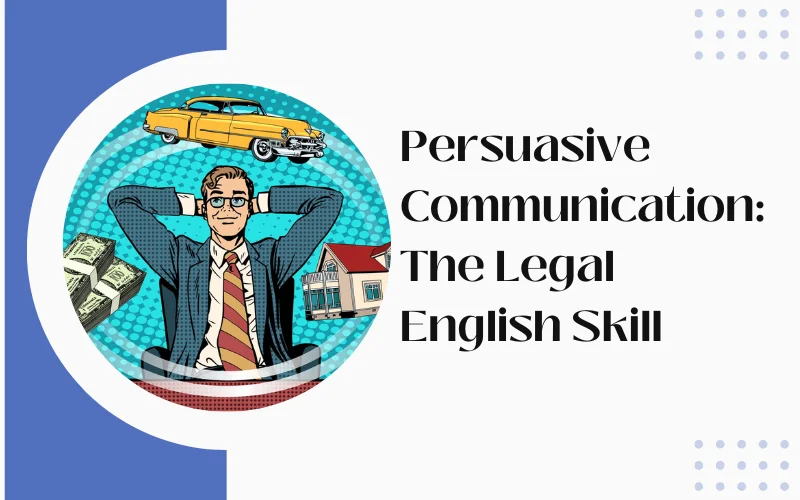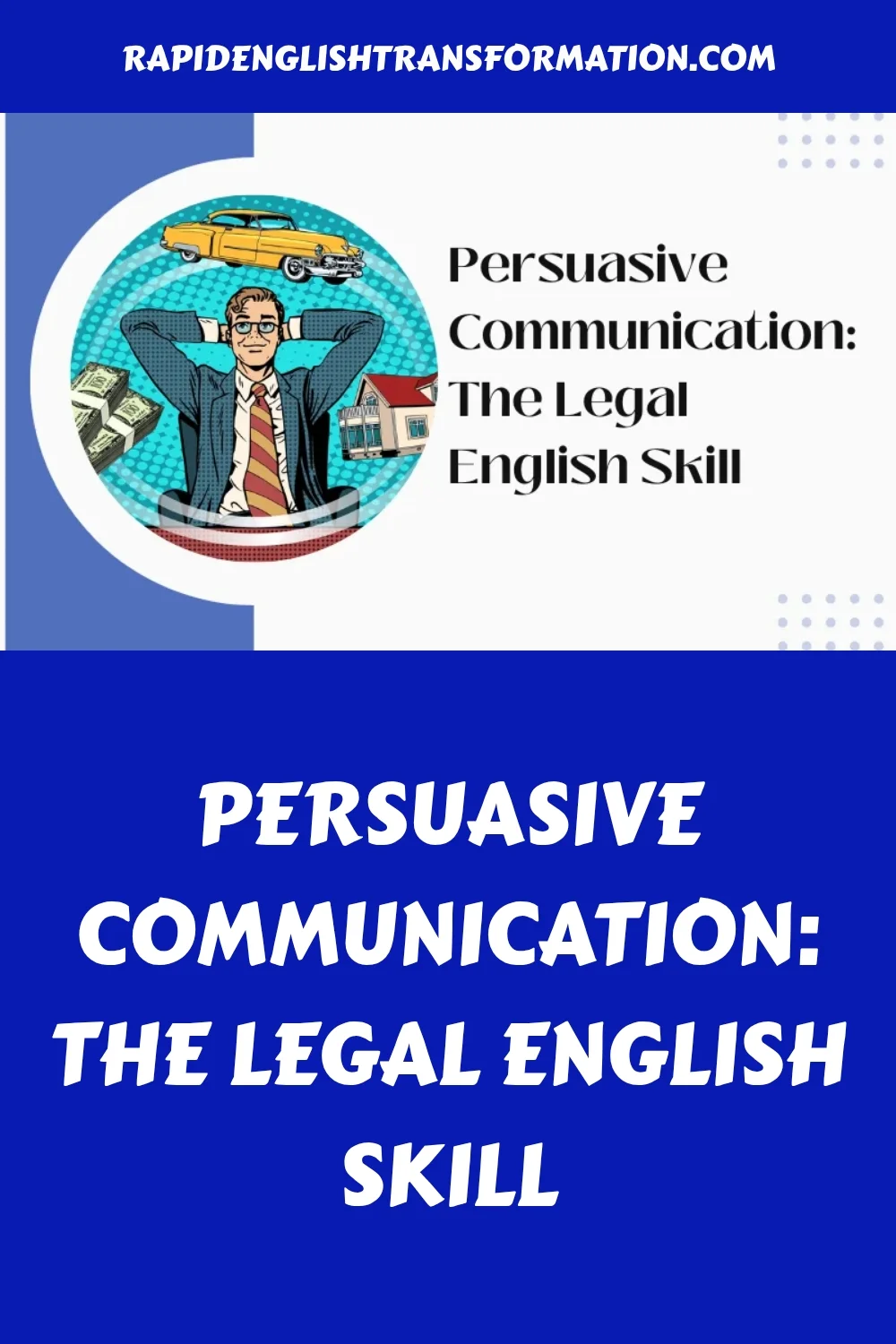Persuasive Communication: The Legal English Skill

You don’t wake up thinking, *“I need to improve my persuasive communication.”*
You wake up thinking, *“I need to improve my English.”*
And who could blame you?
That’s what everyone has taught you to believe — that confidence comes from grammar, vocabulary, and perfect sentences.
But here’s the truth: **it doesn’t.**
Confidence comes from **persuasive communication** — knowing how to express ideas clearly, influence others, and stay calm under pressure.
Every lawyer knows the law is built on language — but few understand how to use that language to lead, persuade, and win trust.
❌
Why Lawyers Fail Without Persuasive Communication Skills
- They sound hesitant instead of authoritative.
- They struggle to hold attention in pitches or negotiations.
- They leave clients unconvinced — even when their legal advice is solid.
Research shows that language shapes perception of credibility.
People are more likely to trust speakers who use confident, vivid, and emotionally resonant communication (*Petty & Cacioppo, 1986 – Elaboration Likelihood Model*).
In legal English, persuasive communication is not about sophistication — it’s about **clarity, structure, and intent**.
When lawyers rely only on vocabulary, they miss the psychological levers that create trust and authority.
✅
Why Persuasive Communication Systems Work
Persuasive communication isn’t a single technique — it’s a system that blends **language psychology, structure, and emotion**.
It works because it aligns how people think, feel, and respond under pressure.
- **Emotional connection** → Words like *wholeheartedly* or *committed* build rapport and empathy.
- **Authority** → Words like *undoubtedly* or *certainly* project confidence (Nature, 2016).
- **Urgency** → Words like *immediately* or *critical* prompt decision-making (Harvard Business Review).
- **Memorability** → Specific, well-chosen words help your message stay in the listener’s mind (Frontiers in Psychology).
Persuasive communication systems combine these effects, using both logic and emotion — the two channels of human decision-making.
That’s why effective frameworks like PREP or PASA, when combined with **Power Words**, create messages that feel trustworthy and commanding.
You can read more about how frameworks transform performance in The Secret Frameworks Lawyers Overlook.
⚡
Persuasive Communication in Action
One lawyer I coached was preparing for a client pitch. His draft language sounded cautious and defensive:
“We think this approach could be correct.”
We reframed it to:
“We can confidently confirm this approach is correct.”
At first, he resisted the change. Like many lawyers, he believed that saying something “confidently” implied a guarantee of success —
that by confirming an approach, he was overpromising or misleading the client.
But that’s not what persuasive communication does.
What he was really saying was simple and truthful:
“We have assessed the situation and believe this is the right course of action.”
There’s an important distinction here. **Confidence in communication is not the same as guaranteeing results.**
It’s about projecting clarity, competence, and reassurance — not certainty of outcome.
Once he understood this, everything changed. The revised phrasing didn’t overpromise — it simply positioned him as a trusted expert guiding the client’s decision.
The result? Immediate. His delivery became composed and authoritative, and his client responded with confidence, not hesitation.
This same clarity and confidence are what helped another client in From Nervous to General Counsel in 10 Weeks move from hesitation to leadership.
This is the power of persuasive communication: it balances **clarity with integrity**,
ensuring that confidence never crosses into misrepresentation.
🎯
Why Persuasive Communication Matters for Law Firms
Clients don’t evaluate you solely on legal accuracy. They evaluate you on **clarity, confidence, and perceived authority**.
McKinsey research shows that firms with strong, purposeful communication outperform competitors by a factor of 3.5.
That performance is driven by how well teams communicate under pressure — not how many words they know.
Law firms that teach persuasive communication systems — not vocabulary lists — build teams who inspire trust, reduce misunderstandings, and close more deals.
I explore this further in How Firms Build Client Trust with Frameworks, which shows how structured communication strengthens entire teams.
🧠
The Psychology of Persuasive Communication in Legal English
The foundation of persuasive communication lies in how the brain processes **certainty and emotion**.
Studies from Harvard Business Review
and Nature reveal that under stress, the brain prefers familiar, structured language.
This is why **systems like PREP and PASA** are so effective — they calm the speaker’s brain while reassuring the listener’s.
**Power Words** are one component of this psychological system.
They act as **cognitive anchors** — signals that trigger confidence and predictability.
When paired with frameworks, they create a communication model that is emotionally intelligent and neurologically efficient.
You can see these in action in How a Lawyer Won Clients in the US with Small Talk, where language precision built instant trust.
🚀
Your Next Step
🔹 The Confidence Script — £147
Affordable entry point.
- 5 communication frameworks, including Power Words.
- 2 live check-in sessions.
🔹 The Clarity Sprint — £249
Serious transformation.
- 10 live coaching sessions.
- Practice persuasive communication until it becomes second nature.
📎 Related Reading
- The Secret Frameworks Lawyers Overlook
- How Firms Build Client Trust with Frameworks
- How A Lawyer Won Clients In The US With Small Talk
🔗 External Sources for Reference
- Petty & Cacioppo (1986) – Elaboration Likelihood Model
- Nature (2016) – The Psychology of Confidence Language
- Harvard Business Review – Motivation and Urgency in Communication
- Frontiers in Psychology – The Neuroscience of Persuasion
- McKinsey (2020) – Communication and Business Performance
- Harvard Business Review – How to Handle Stress in High-Pressure Situations
Generated with Pin Generator
⚡ The Influence Pack: Essential Frameworks for Fast Results
Tired of losing impact in English?
Learn how top international lawyers use structure and influence frameworks to win clients, negotiate confidently, and speak with control — **in just a few hours.**
- 📘 Essential Toolkit
- 🎯 Instant Results
- 💬 Designed for Legal Professionals
Enroll now for only £29.99
Start Now →Next step: The Clarity Accelerator — build the full system.
Secure payment • Instant lifetime access

